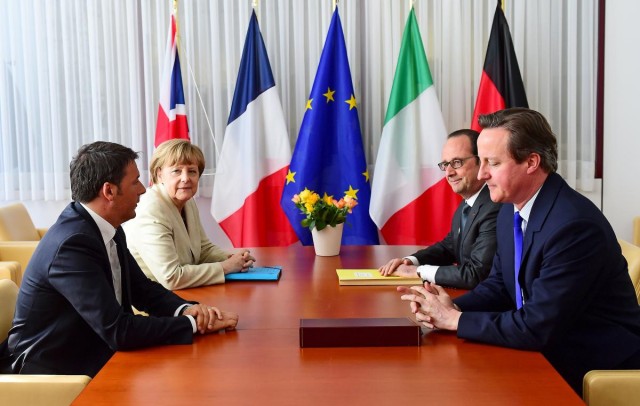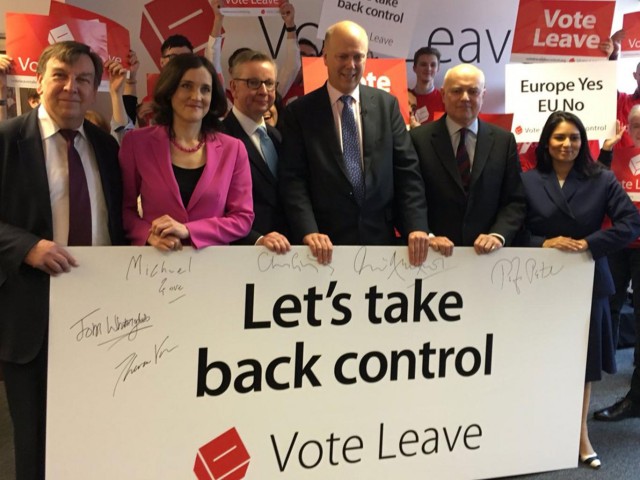By Suryansh Upmanyu
1975: 67% people vote yes to the question “Do you think the UK should stay in the European Community (Common Market)?” in the last referendum which took place in Britain.
Fast forward 40 years, and a similar situation is arising. But this time, the outcome could be different.
A referendum will be held in Britain on June 23, 2016, the question being “Should the United Kingdom remain a member of the European Union or leave the European Union?”
You got the point. The referendum will obtain the people’s view on whether Britain should go independent or stay in its turbulent relationship with the European Union. The referendum is also being held at this time because, by 2020, all EU members have to adopt the Euro. This is not a good option for Britain as the Euro is weaker than the Pound right now.
Now you need to know the details.

Why should Britain leave?
- EU members are required to keep their borders open to goods, services and people within Europe. But this resulted in Britain seeing a net immigration of over 300,000 people in 2015 alone due to the recent refugee crisis. Leaving EU would mean it would have more control over its own borders.
- Membership to EU is not free. It costs around 24 million pounds PER DAY for a country to keep its membership.
- The European Commission members are not directly elected to office but have a considerable say in the laws that are made. These laws also take precedence over a country’s own constitution and is seen as undemocratic.
- There have been talks about EU having its own army. But again, that would imply a country losing some control over its own military, therefore, this move is highly criticized by Britain
- An opinion is substantiated when you have examples to prove your point. Supporters of Brexit frequently mention Norway, a prosperous country which is not a part of EU but still has trading relations with it.
Why should Britain stay?
- Over 3 million jobs in Britain depend on its trade with EU. That would imply a lot of unemployed workers if they decide to part ways.
- EU is Britain’s major trading partner – including countries like Germany and France. As a member, it is able to have a major say in its trading agreements with other countries which will not be the case if it opts out.
- If it is easy for refugees to come in, minimal border control also facilitates Britons to seek employment abroad
- As a member of EU, Britain comes under the jurisdiction of the European Arrest Warrant, which negates the need for extradition procedures and makes the judicial system faster
- The European Union has a sufficient clout in global affairs. It could be the case that foregoing its membership will lead to Britain losing its influence over key international issues.
The announcement of the referendum has led to the formation of several lobbying groups, both for and against Brexit. Here are the prominent ones:
- Britain Stronger in Europe: They support the status quo. As their website announces a countless number of times, UK will be stronger as a part of EU. (The number of times they have used stronger is too damn high! My English teacher would have cut my marks if I used the same word so many times.)
Check out their promotional video: http://blogs.spectator.co.uk/2015/10/britain-stronger-in-europe-launches-with-celebrities-and-a-dose-of-patriotism/
Ooooooh they have Richard Branson on their side! I am sold!
- Vote Leave: The pro-independence movement which is being funded by former Conservative treasurer Peter Cruddas and Labour supporter John Mills.
https://youtu.be/0tItgGcWVHw
What I can observe from their campaigns is that BSE is using celebrities while Vote Leave is providing statistics to prove their point.
External Reactions:
An exit by Britain could reduce EU’s clout in foreign matters and also lead to a highly unstable economic situation. This has been agreed upon by most of the leaders of the EU member countries. But they do not want Britain to use this reason as bait to negotiate favourable terms for itself in the long run.
Therefore, the negotiations continue. And the world watches with bated breath.
Recent Developments:

Last week, David Cameron met with other EU officials to strike out a deal to keep Britain in the Union. Here is how the negotiations went:
- Sovereignty: Cameron wanted a proposal allowing Britain to opt out of EU in the future if they were ever forced to be integrated into a tighter political union with the other members, thus losing control over their own policies.
He has secured an agreement with the others, but according to skeptics, this does not amount to the legislative having an independent say in its own matters.
- Immigration Issues: The Conservative manifesto during the 2015 elections mentioned: “We will insist that EU migrants who want to claim tax credits and child benefit must live here and contribute to our country for a minimum of four years.”
The manifesto also pledged to “end the ability of EU jobseekers to claim any job-seeking benefits at all”, adding that “if jobseekers have not found a job within six months, they will be required to leave”.
Mr. Cameron had to make some compromises here. EU agreed to the 4-year duration to claim benefits and expulsion of migrants not getting a job for 6 months, but rejected other proposals like stopping migrants from sending child benefits money to their home country.
- Economic Governance: The British Prime Minister wanted recognition from the EU that euro was not the only currency in the Union, and that Britain would never be forced to contribute to financial bailouts.
Even though it was recognized that Euro is not the only European currency, France resisted Britain’s attempt to win any “exceptions to the rules of the EU”.
- Competitiveness: Reducing administrative burdens and preventing the EU from regulating trade to allow competitiveness in the market was the key issue here.
Here Mr. Cameron got what he wanted (also, because it was the least controversial of his demands)
After the meeting, Mr. Cameron announced that the referendum will take place on June 23 and that the government was officially asking the citizens to vote for staying in the Union (since most of his demands were met). But he allowed the Members of the Parliament to choose any side they wanted so that they could publicise their opinions too.
John Whittingdale, Theresa Villiers, Michael Gove, Chris Grayling and Priti Patel launching the Vote Leave campaign
And so we wait. Just like the Scottish Referendum, the world will watch on as the Brits will exercise their right to decide whether to stay, or break up.

I don’t care whatever happens. Just as long as it does not lead to another global meltdown. Here are the reasons for the recent Indian Stock Market Crash. http://edtimes.in/2016/02/indian-stock-market-crash.html



































